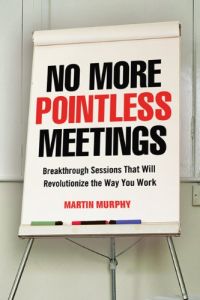In conference rooms around the globe, a daily ritual takes place: the meeting – the primary workhorse for getting things done in every business and organization. Yet traditional meetings can suck energy out of the room, creative juices out of the participants and time right off the clock. Management consultant Martin Murphy offers an alternative to mind-numbing meetings: “workflow management sessions.” As he brags on page one: “I can walk into any conference room cold and lead it in a manner that gets more done in a shorter period of time than anyone in the room has ever experienced.” If this provokes your interest, getAbstract suggests giving Murphy’s system a try to see how much is applicable to your firm, or, at least, having a meeting to discuss it.
From Meetings to “Workflow Management”
Most firms handle their day-to-day business during meetings. Traditional meetings can be time consuming and unproductive. Digital conferencing doesn’t reduce the number of unproductive meetings; it just puts them on new platforms. As the complexity of business increases and response time decreases, firms must make meetings efficient and productive.
Manager Versus Facilitator
Transforming the traditional structure of meetings into workflow management sessions achieves definitive results. The common threads in each session are the use of a facilitator to run the gatherings and the directive to separate content and process. Content, in this context, refers to the focus or purpose of the meeting. Process is the meeting’s logistics – place, seating layout, tone, energy level, and the numbers and types of attendees.
The primary reason traditional meetings are unproductive is that the person officiating is usually the highest-ranking manager present. He or she directs the meeting and participates in discussions. However, meetings actually are more efficient when junior members run them. Participating in content conversations...

































Comment on this summary